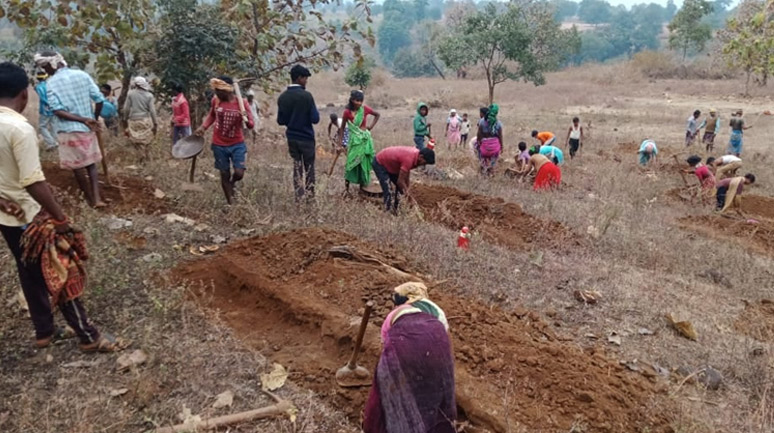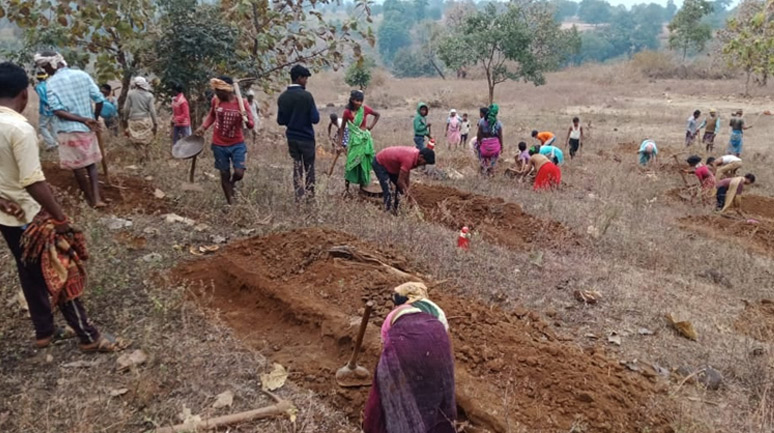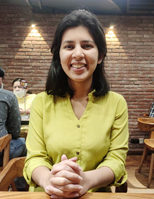Understanding Rural Society in Pandemic Times through Virtual Field Visits


Collaborating with PRADAN and organizing virtual field visits is a creative way to bridge the gap, in current times for students, between theory and practice; this may well-nigh be a complementary methodology that can be continued even after the crisis brought about by the pandemic has abated
T he current pandemic has restricted university and school students to their homes. Speculating or having a certain date in sight about the end of the pandemic in the country at this time seems unreasonable. The current strategy of lockdown of large parts of society is not going to be sustainable in the long run. Schools and colleges experienced a paradigm shift while they struggled to adapt to e-learning on various online platforms. Many students reported not having set foot in their college campuses even once although one year had passed since they took admission; if the pandemic continues, a majority of college students will have lost the opportunity of being in a college and being exposed to various forms of peer learning.
Moreover, restrictions on field visits for students pursuing subjects such as Social Work, Development Studies and Rural Development has the potential to leave these courses unfinished or partially finished. Visiting the field is important for the students of such courses in order to relate theoretical concepts with what goes on in reality in villages through their observations and reflections during these visits. In the current scenario, experiential learning in a multitude of contexts and settings outside the classroom is painfully negligible and students have to rely on anecdotes of other rural development professionals or researchers to validate their lessons. To address this partly, Tata Institute of Social Sciences, Hyderabad [TISS (H)] wrote to PRADAN hoping to engage its students through virtual workshops that would recreate similar experiences, to the extent possible, and thereby enhance their understanding and learning.
The students of MA in Development Studies Programme at TISS (H) were thus taken on a virtual tour to rural areas in January 2021 for three days, as part of their Experiential Learning course ‘Understanding Rural Society’. PRADAN conducted a three-day workshop with about 30 students. The broad objective of the course was to provide the students exposure to the rural areas of the country, thereby helping them develop practical understanding about rural economy, society and polity. Earlier, the students would physically visit villages, gain some exposure and write their internship reports and reflections, based on their field visits.
Although the workshops were to introduce the students to a wide array of knowledge on practising development, the specific expectations from these workshops facilitated by PRADAN were to generate an understanding of and insight into a) PRADAN’s methodology of support and programmes in developing rural areas; b) specific learnings from the community, local markets, local self-government¬—Panchayati Raj Institutions (PRIs); and c) convergence of programmes and services implemented for development.
To establish an understanding of these three different contexts and settings, students were engaged with three development themes and projects in three states, curated by Nivedita Narain in PRADAN with Poulomi Bhattacharya in TISS (H). The first day was facilitated by the Promotion of Agriculture Production Cluster (APC) team in Odisha, led by Satish Patnaik and Soubhagya R Ratha; the second by Shuvajit Chakraborty and the CHIRAG team in Chakai, Bihar; and the third by Ashutosh Nanda on the Chhattisgarh Mega Watershed Project. The macro design of the workshops was developed by the three project teams (See Boxes 1, 2 and 3).

T he facilitators spoke about the key developmental challenges addressed by the three projects and followed this up with discussions. The virtual ‘field visit’ had local community members participating on all the three days, covering three themes: sustainable livelihoods, sustainable food systems and Natural Resource Management. Students also understood how activities in the three themes supported the development of rural women, their households and communities in the intervention areas.
The following are some of the students’ observations of the three contexts, developmental themes and projects, and takeaways from the three-day experiential learning workshops.
DAY 1: Promotion of Agriculture Production Clusters (APC), Odisha
This project is a collaborative effort between PRADAN and the Department of Agriculture and Farmers’ Empowerment, Odisha, Department of Panchayati Raj & Drinking Water and Bharat Rural Livelihood Foundation (BRLF), to create sustainable livelihoods for poor, tribal and other vulnerable households by collectivizing them into Producer Groups (PGs) and Producer Companies
Observations and Learnings of the Students
“Local issues the project is trying to address: Agricultural Production Clusters (APCs) support resourceless farmers to move towards prosperity, based on the hypothesis that right knowledge and market ecosystem linkages can recreate synergistic demand-and-supply conditions in agricultural societies. Under this, farmers from multiple SHGs are encouraged to come together to form PGs.
To assist the farmers in procuring agriculture inputs such as ‘winner’ crops and quality seed, and along with helping in interlinking the market and the farmland and removing middlemen, Agricultural Entrepreneurs (AEs) are selected from each PG. AEs get commission by acquiring best returns from the market. They also ensure (through bargaining and negotiations) that farmers pay lower prices for farm inputs (due to bulk buying) and are offered the best price for their produce. A key job of an AE is to attract young minds to elevate the income of tribal groups. And because they are selected from among these very tribal groups, AEs are reliable as well as accountable.
BOX 1: MACRO DESIGN FOR DAY 1
- Farm prosperity and smallholders
- Need for APC, Producer Company: Experience till date
- Need and role of Agriculture Entrepreneurs (AE)
- Virtual field visit to Karanjia (discussion with Producer Group members about PG and APC) and Discussion with AE
- Open session (Q & A)
Project Outcomes:The project facilitated marginalized farmers in developing robust, climate-resilient infrastructure to ensure a greater number of sustainable livelihood opportunities. The project also supported the community in offering space for democratic decision-making among PGs at different stages. For instance, the selection of AEs was done through discussions and by arriving at a consensus. Through such processes, the community has an understanding about the relevance of collectivizing for the cause of ensuring a dignified life for everyone.”
DAY 2: Creative Hub for Innovation and Reciprocal Research and Action for Gender Equality (GRTA-CHIRAG project), BIHAR
CHIRAG is a sub-project of the Global Research Translation Award undertaken by University of East Anglia (UK), in partnership with Gram Vaani, Kalinga Institute of Social Sciences (KISS) and PRADAN. In PRADAN, the project, currently being operated in Chakai, Bihar, is committed to the co-production of knowledge and the upscaling of local innovations as pathways to sustainable food systems in order to address food and nutrition security.
Observations and Learnings of the Students
- A short introductory video
- Brief overview of the demography: Santhal Parganas & Chakai
- Introduction of the concept of Sustainable Food System (SFS) and why it is important
- Introducing project ‘CHIRAG’ and how the project takes the agenda of SFS forward.
- Film screening (Film made by Lahanti Club members and community youth volunteers in Chakai on uncultivated food items in the project)
- Short discussion
- Brief overview of the CHIRAG project (its aspects: IVRS, programming, curriculum, skill
“Local issues the project is trying to address: Food insecurity, indebtedness and lack of employment has pushed a majority of the population in Chakai region to migrate to distant places for work and money. The tribal culture, including food habits, lifestyle and agricultural knowledge, seems to be fading. A major predicament for the community—in fact one that is fundamental to all the other problems as well—was the low self-view people have of themselves.
“CHIRAG project showed us that the community is, in its own way, self-sufficient and a knowledge hub stemming from its inter-generational traditional understanding. However, generations of colonization as well as alienation by the mainstream population has made Santhals consider themselves as less than, or inferior, to others.”
Several processes were put to use by the project, including working with women and youth groups to generate knowledge on food choices and technologies; conducting various skill-building activities such as video-making, editing, etc., for the local youth so that they can create videos and documentaries on traditional food practices and knowledge systems; dissemination of ideas and content about traditional food habits through ChiragVaani, the local community radio; and adding food system knowledge to the curriculum of schools and colleges, to have a positive impact on the young generation. Consequently, this would replace the unsuitable dietary practices and health problems of Santhals.
Project Outcomes: Traditional forest foods, such as ‘aat asar (root and tuber’ and mushrooms), which had lost their place in tribal diet have been identified as nutritionally rich by the community and brought back to the plates. Knowledge-sharing on various platforms has helped in promoting traditional food habits effectively and has rejuvenated culture-specific practices. Many of these programmes have also helped youth and women to learn various skills, leading to earning a livelihood and also providing temporary employment.”
Day 3: Chhattisgarh Mega Watershed Project
With the goal of improving rural livelihoods through investment in water and soil conservation, and with MGNREGA at the Centre, the Government of Chhattisgarh is partnering with Bharat Rural Livelihoods Foundation and Axis Bank Foundation to launch the ‘High Impact Mega Watershed Project’ in 12 districts of Chhattisgarh. PRADAN, along with 12 other civil society organizations (CSOs), is facilitating the community-led planning process under MGNREGA and supporting gram panchayats in implementing Natural Resource Management (NRM) activities effectively.
Observations and Learnings of the Students
Local issues the project is trying to address: “In these areas, more than 50 per cent of the farmers are marginal landholders. The forest helps people sustain themselves through the collection of non-wood forest produce.
The project has adopted Integrated NRM as an approach to agriculture, based on responsible and broad-based management of land, water, forest and biological resources needed to sustain agricultural productivity and avert degradation of potential productivity. Focusing on water, the project is constructing watershed management infrastructure for the community through the construction of ponds, canals, etc., and indirect potable water re-use framework. Key watershed management activities were delivered through collaboration with MGNREGA.
The project recognizes the need for people, institutions and resources to come together in a way that developmental goals are delivered efficiently.
- Village resources and their relationship with the community
- Perspectives of NRM and why it is important in today’s context
- Listening to Change Agents¬ on participatory planning/ensuring grass-roots governance for NRM
- Decentralized planning process for conserving natural resources through MGNREGA
- Conserving soil and water for livelihoods and establishing linkages with stakeholders: The Mega Watershed Project experience
- Collaboration and convergence: The new approach to NRM—the Mega Watershed experience with 13 CSOs, Government of Chhattisgarh
- Open session (Q & A)
Project Outcomes: Much has been achieved so far in the southern parts of Chhattisgarh in river rejuvenation, groundwater recharge, soil and land conservation, and also in improving poultry and other livestock management. Marginal farmers will soon have higher agricultural productivity with improved water resources in the villages.”
Take-aways and University-PRADAN Collaborations in the Future
By the end of the three-day workshop, the students had several take-aways.
“The three packed days of virtual learning with PRADAN, through different rural communities, helped us gain practical insights on the philosophy of development. Interactions with the villagers fostered respect for the local environment, language and beliefs, and commitment to the cause of betterment of rural life. It taught us what it takes to nurture the right attitude as a development professional. We gained tremendous learning and insights on several issues that villagers face and these will stay with us all our lives.”
Although there are challenges of access, intermittent power supply, Internet glitches, lack of space for students living in remote areas and coming from vulnerable sections, and unable to keep up with their online courses, many reports have accounts of the benefits of e-learning and ways of building on this possibility. Questions emerging would be: How can we conduct field visits in rural areas for students of development studies or rural studies online? Assuming that there is no single answer to this question, in the current scenario, building on the potential of a virtual platform and taking the learnings in post-pandemic times will be one of the ways to look at it.
TISS (H) students have described each of the projects in great detail in their observations and learning notes from the three-day workshop. The students were extremely interested in interacting with the community members online, wanting to know more about their lives and their journey as compared to engaging with theoretical concepts such as ‘sustainable food systems’ or ‘natural resource management’. Whereas what the PRADAN teams presented (considering the short preparation time they had) is deeply appreciated, a need for strengthening these modules for engaging the students online also emerged. The need of the hour is online modules that have the potential to integrate community perspectives and developmental challenges that PRADAN is addressing so that the students are able to relate with, and reflect on, intervention processes keeping theoretical concepts studied by students in mind. In post-pandemic times, when the internships and field visits roll back to normal, virtual field visits as an opportunity for students to learn and engage with PRADAN can still remain complementary learning opportunities. Leveraging the opportunity that technology is offering, together with the slow and steady reach of Internet in the hinterlands, might just show us new pathways of engagement. To start with, let us see this as a low-hanging opportunity that the students could learn about three different tribes, demographics and developmental challenges, and how a field NGO is addressing those challenges in just three days.

Yashna Singh

Aman Zacharia
With inputs from the blog by Yashna Singh and Aman Zacharia, MA in Development Studies Programme, Tata Institute of Social Sciences, Hyderabad Campus

